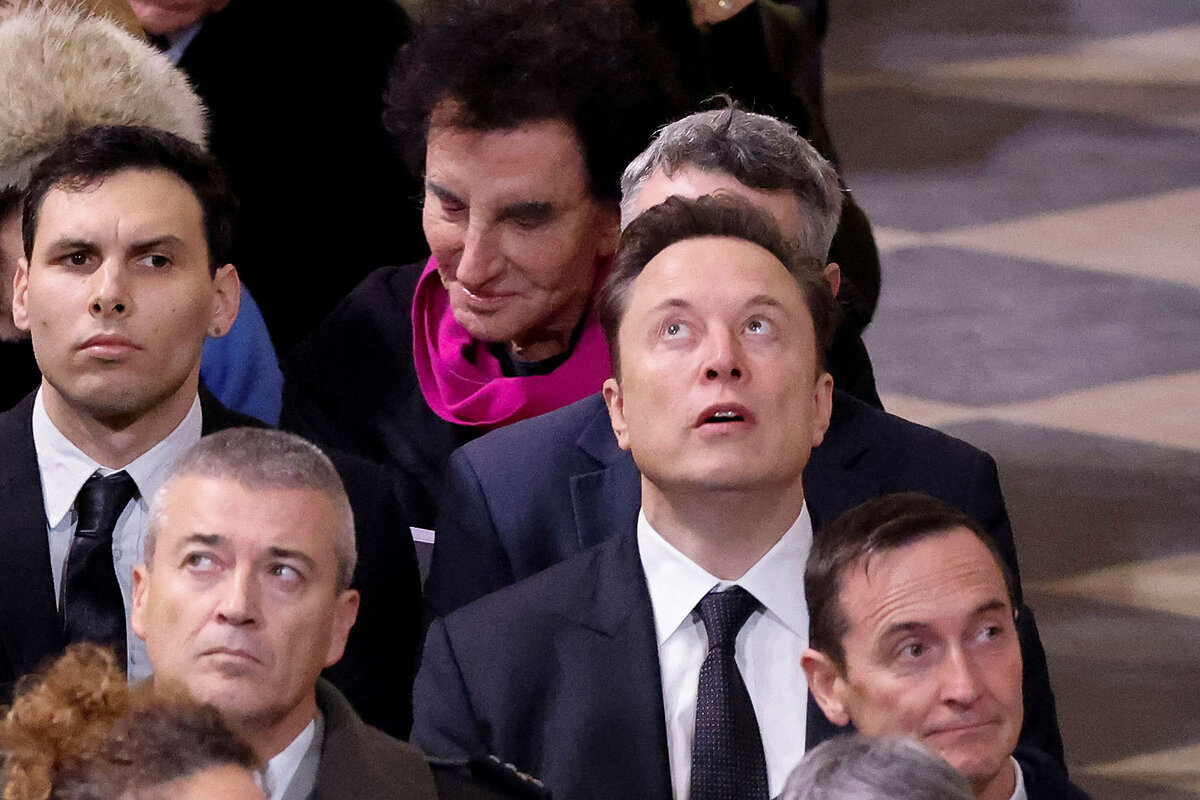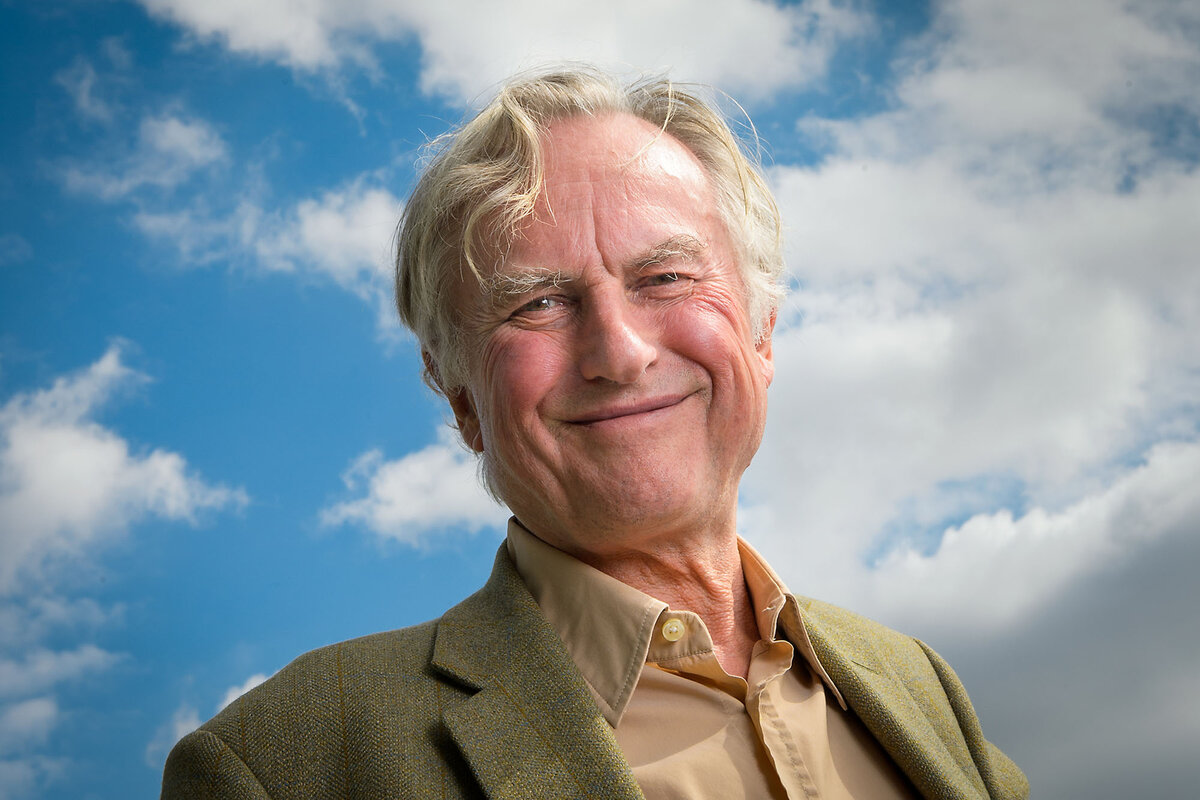Elon Musk now calls himself a ‘cultural Christian.’ What does that mean?
Loading...
| Washington
Elon Musk, a famous name famously associated with atheism, now calls himself a cultural Christian. He joins other prominent figures – such as scientist Richard Dawkins – who’ve used that phrase this year to describe themselves.
The term “cultural Christian” seems to exist almost exclusively online. But it’s not out of nowhere. Many people call themselves cultural Jews or cultural Catholics, for example. And lots of Americans decorate Christmas trees and gather with family on Easter, observing traditions rooted in Christianity, though they may not attend church or believe in the Christian God.
As fewer Americans attend church, a space has opened between religion and spirituality. “Cultural Christian” is one of the terms people are using to define themselves in that space. Mr. Dawkins, author of “The God Delusion” and one of the most famous atheists in Britain, this spring said that he identifies himself as a cultural Christian. It is a startling turn for a man once dubbed one of the “four horsemen” trying to bring on an atheist revolution, to now see value in the morals and traditions of a religion.
Why We Wrote This
Some famous atheists have now adopted the term “cultural Christian” to describe themselves. What does it mean, and how is that playing out in an increasingly secular America?
Figures like Mr. Musk and Mr. Dawkins may be realizing that societal norms they value come from religious culture, and that is prompting them to try to hold on to those norms without the religious basis for them, says Robert Royal, president of the Faith & Reason Institute.
Mr. Musk “has a kind of bellwether quality,” says Dr. Royal. “I think he senses kind of a shift in the culture when he says he’s a cultural Christian.”
Everyone has their own definition
“We’ve known for a long time that a lot more people think of themselves as Christian than participate in Christian [congregations],” says Arthur Farnsley II, a research professor of religious studies at Indiana University in Indianapolis.
“I’m pretty sure that when a Christian calls somebody else a cultural Christian, they mean, ‘You feel like all this stuff is true and important; you just don’t want to make any commitment.’ It’s a low-level insult,” says Dr. Farnsley. “But when someone smart calls themselves a cultural Christian, they mean, ‘I think this religion is an important part of Western civilization, and I like Western civilization. I just don’t believe the hard parts.’”
The United States is a little unusual in its approach to religion compared with much of the rest of the world, where religion is also a cultural force, says Mark Movsesian, a professor at St. John’s University School of Law. And since its founding, America has been heavily influenced by Protestantism.
“It just means the kind of view of, What is important is your personal relationship with God. You have to really personally take this in and believe it,” says Mr. Movsesian, director of the Mattone Center for Law and Religion. “And it’s not a matter of culture. It’s not a matter of the Christmas tree and the party with friends around the yule log. That’s not what it’s about. It’s about your personal relationship.”
In his 2012 book “Flea Market Jesus,” Dr. Farnsley wrote about vendors and their views of American institutions, especially religion. While most were “folk Bible believers,” few attended church. They held religious beliefs because it’s what their mothers and grandmothers taught them, because that’s “what good people believe.” “That’s one way to be culturally Christian,” says Dr. Farnsley.
What has been the fastest-growing religious category for years is known as the “nones,” including atheists, agnostics, and people who identify as “nothing in particular.” Among those, the number of atheists has barely changed in decades, while the number who identify as “nothing in particular” grows.
Mr. Musk said he believes Christian beliefs “result in the greatest happiness,” and suggested that the decline of religion is a driver of dropping birth rates.
For his part, Mr. Dawkins said he appreciates hymns and cathedrals.
“I like to live in a culturally Christian country, although I do not believe a single word of the Christian faith,” said Mr. Dawkins in an interview with the British radio network LBC. He said he’s also uncomfortable with the rise of Islam in the United Kingdom and sees Christianity as a bulwark.
“I’m on team Christian’s side, as far as that’s concerned,” he said.
It’s not new for political or thought leaders to invoke theology they themselves don’t necessarily believe. J. Edgar Hoover, for example, incorporated aspects of religion into his role as FBI director.
“He was kind of this version of a cultural Christian, where he believed in the importance of Christianity in the kind of fight for America, and the kind of America that he wanted,” says Sam Herrmann, a doctoral student at the University of Pennsylvania who is researching the history of evangelicalism.
Over the past 75 years, American conservative politics have been imbued with mixed theological and political statements, says Mr. Hermann. “Then there’s a culture that’s built around that, and so you get these masculine Christianities, or you get these kind of capitalist Christianities, these iterations of religion and culture and politics that come together in this trifecta.”
Mr. Herrmann, who grew up in the evangelical tradition and attended Liberty University, says he wouldn’t consider himself part of the “spiritual but not religious” category. While he doesn’t consistently engage with church in traditional ways, he still feels “within the tradition” of Christianity.
Walking away from an organizational structure, he says, is “right in line with the tradition of Protestantism. It’s a history of breaking apart from some other structure in order to kind of distinguish yourself.”
“A misunderstanding of Christianity”
Congregations aren’t necessarily composed of people who see themselves as part of a given denomination. At St. Philip’s United Methodist Church in Houston, probably a little over half the congregation members call themselves Methodist, says Katie Eichler, the head pastor. The remainder, and for the most part the younger members, were drawn to St. Philip’s for its atmosphere and community, not for its doctrine.
While Ms. Eichler doesn’t hear people using the term “cultural Christian” in her congregation, some might fall into that category and might attend church more out of a sense of family obligation, she says.
“I don’t think there’s a problem with a cultural understanding of Christianity,” says Ms. Eichler. “But if it’s not pushing us to love our neighbors, then it’s a misunderstanding of Christianity.”
Many other Christians share the view that faith must be demonstrated. “When people say they’re cultural Christians, I think they’re struggling to practice it on a daily basis,” says Brian Bakke, who has worked in Southern Baptist ministry.
Though Mr. Bakke, who lives in Washington, D.C., attended a Southern Baptist church for years, he didn’t consider himself part of the denomination. Today, he’s disheartened by what he sees as a failure by the church to back up words with actions.
“There’s this powerful movement, and it comes in cycles, where in order to be a Christian, you have to separate yourself from the world – by that I mean all secular stuff,” he says. In many cases, that results in people having “no idea how to talk to their neighbors, who might be secular.”
Ways of engaging
“I might consider myself a cultural Catholic,” says Linda Serepca, director of the Charlotte Spirituality Center in North Carolina. While she might not attend weekly Mass, there are elements of Catholicism she holds “very dear,” such as liturgical seasons. “It’s the culture by which I was formed and still hold reverence for.”
While in the past identifying as a cultural Christian might have been an indication that someone was disengaging from organized religion, it now might suggest a step back toward it, says Dr. Royal.
“A lot of people who are feeling that something is wrong in the culture may not be quite ready yet themselves to confess some religion, and they may never,” says Dr. Royal, who is Catholic. “But they do detect that there’s something that came out of our tradition.”








